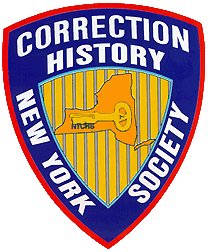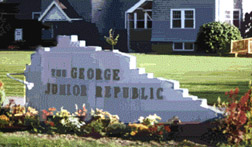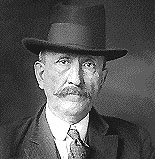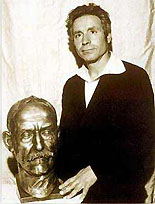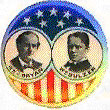|
CHAPTER ONE: WHY I WENT TO PRISON
Many years back, in my early boyhood, I was taken through Auburn Prison. It has always been the main object of interest in our town, and I was a small sized unit in a party of sightseers. No incident of childhood made a more vivid impression upon me. The dark scowling faces bent over their tasks; the hideous striped clothing which carried with it an unexplainable sense of shame; the ugly close cropped heads and shaven faces; the horrible sinuous lines of outcast humanity crawling along in the dreadful lockstep; the whole thing aroused such terror in my imagination that I never recovered from the painful impression. All the nightmares and evil dreams of my childhood centered about the figure of an escaped convict. He chased me along dark streets, where I was unable to run fast or cry aloud; he peeked through windows at me as I lay in bed, even after the shades had been pinned close to escape his evil eye; as I ascended a flight of stairs in dreamland and looked back, he would come creeping through an open door, holding a long knife in his hand, while my mother all unconscious of danger sat reading under the shaded library lamp; he was a visitor frequent enough to make night hideous for a time, and it was many long years before he took a departure which I trust is final. After this early experience I carefully avoided the Prison. Its gray stone walls frowned from across the street every time I departed or arrived on a New York Central train, but I made no effort to go again inside. In fact, I persistently refused to join my friends whenever they made a visit there; once had been quite enough. . . . Then my official connection with the Junior Republic and its successful training of wild and mischievous boys brought me in touch with the Prison System. I had been interested in the Elmira Reformatory and had visited Mr. Brockway, the superintendent of that institution. I became acquainted, quite by chance, with a certain prisoner in Sing Sing, and through him interested in other prisoners, there and in Auburn. In due time, I began to appreciate the importance of the general Prison Problem and the difficulties of its solution. Also, I felt that my experience in the Junior Republic had given me a possible clue to that solution. . . .
I felt that there was a great need of some one's making a study at first hand -- some one sympathetic but not sentimental -- of the thoughts and habits of the men whom the state holds in confinement. It is easy to read a textbook on civil government and then fancy we know exactly how the administration of a state is conducted; but the actual facts of practical politics are often miles asunder from the textbook theory. In the same way "the Criminal" has been extensively studied, and deductions as to his instincts, habits and character drawn from the measurements of his ears and nose; but I wanted to get acquainted with the man himself, the man behind the statistics. So the idea of some day entering prison and actually living the life of a convict first occurred to me more than three years ago. Talking with a friend, after his release from prison, concerning his own experience and the need of changes in the System, I brought forward the idea that it was impossible for those of us on the outside to deal in full sympathy and understanding with the man within the walls until we had come in close personal contact with him, and had had something like a physical experience of similar conditions. . . . "There is no question but that you'd learn a lot," he said; then added, "but I think you'd find it rather a tough experience." He made the suggestion that if ever the plan were carried out autumn would be the best season, as the cells would be least uncomfortable at that time of year. . . . [I]n the summer of 1912, being confined to the house by a slight illness, I read Donald Lowrie's book, My Life in Prison. That vivid picture of prison conditions, written so simply yet with such power and such complete and evident sincerity, stirred me to the depths. It made me feel that I had no right any longer to be silent or indifferent; I must do my share to remove the foulest blot upon our social system.
Thereafter when called upon to speak in public, I usually make Prison Reform the subject of my talk, advancing certain ideas gathered from my experience with the boys of the Junior Republic, endeavoring not only to crystallize my own views as to the prisons but to get others to turn their thoughts to the same direction. Finally came an appointment by Governor Sulzer to a State Commission on Prison Reform, suggested to the Governor by Judge Riley, the new Superintendent of Prisons. My position as chairman of the Commission made it seem desirable, if not necessary, to inform myself to the utmost as to the inner conditions of the prisons and the needs of the inmates. I do not mean that it was necessary to reinvestigate the material aspect of the prisons -- it is known already that the conditions at Sing Sing are barbaric, and those at Auburn medieval -- but it was desirable to get all possible light regarding the actual effect of the System as a whole, or specific parts of it, upon the prisoners. . . . I began to feel, therefore, that the time had come to carry out the plan which had been so long in the background of my mind. . . . [T}he Superintendent of Prisons and the Warden at Auburn approved; and last but not least, an intelligent convict in whom I confided thought it a decidedly good idea. None of us, to be sure, realized the way in which the thing was actually to work out. . . . We were not prepared for the way in which the imaginations of many people, both in and out of prison, were to be touched and stimulated. Originally I had intended to enter the prison in disguise. . . [H]owever, this idea was given up. The Warden felt strongly that there would be danger of the best possible disguise being penetrated where so many pairs of sharp eyes were on the watch; and I agreed with him that in such even I could not avoid being set down as a spy by both officers and prisoners and my real object fatally misunderstood. The little additional knowledge I might secure by being unknown would not pay for the danger of complete failure. In this conclusion the intelligent convict joined, for he had pointed out from the first that, while there were certain obvious disadvantages in being known, yet there were also certain advantages great enough to more than counterbalance. He said that if I could spare two months for the visit it would be better to come disguised, but that it would certainly take as long as that to get into the game. "You know we're awful suspicious," he added, by way of explanation; "and we don't open up to any new fellow until we know he's on the level." He maintained therefore that, having only a week, I had much better make no secret of it, but come in my own person. His view was confirmed by the event. I not only learned far more than if I had been unknown, but I so gained the confidence of the prisoners that many of them have become my devoted and valued friends. The account in the following chapters of my week in Auburn Prison is taken from the pages of a journal I kept during my confinement. In that I jotted down, day by day, every incident no matter how trivial it seemed at the time; so that I possess a very complete record of my week in prison. As I have transcribed the pages of the diary I have lived over again every moment of that remarkably vivid experience, finding that almost every act, every word, every detail, is fairly burned into my memory. I have scarcely needed the pages of the journal, nor the long account of our week together which my working partner in the basket shop, Jack Murphy, wrote out at my request. I shall not attempt to draw up any bill of indictment against the Prison System, or to suggest specific improvements, either in general principals or administrative details; I shall simply set down the facts and my feelings as accurately as I can. One final word by way of introduction: Many newspapers. . . have expressed the idea that nothing of value could possibly have been obtained because I was not a real convict, although the same newspapers would probably be the first to discredit any statements a real convict might make. Foreseeing such criticism, I had tried to forestall it in the remarks I addressed to the prisoners the day before my experiment began; and if some of my editorial critics had taken the trouble to read their own press dispatches, they might have been saved some distress of mind.
No one could have understood better than I did at the outset, that it is impossible to place yourself exactly in the shoes of a man who has been sentenced to prison for an actual crime; I did not expect to do so. No one, so far as I know, has ever yet succeeded in putting himself precisely in the place of another in any given set of circumstances; yet that does not keep us from constantly studying and analyzing the human problem. It still remains true that "The proper study of mankind is man." In this particular instance, perhaps some things of value were obtained for the very reason that I was not a criminal. Possibly I could judge of some matters with a juster appreciation than could any man suffering involuntary imprisonment. It did, in fact, surprise me very much that anyone could succeed to so great an extent in putting himself in the place and in sharing so many of the sensations of an actual prisoner. Time and again I heard from others the expression of thoughts and feelings which I recognized as those which had swept over me; and I found that, partly by force of imagination and environment and partly by the actual physical conditions of confinement, one could really come into astonishingly close sympathy and understanding with the prisoner. The truth of this can, I believe, be seen in my narrative, and has been demonstrated many times since my release. Of course all this would not have been possible had not the attitude of both officers and inmates been just what it was. As I look back, it seems to me that all hands played their parts to perfection. The strict orders of the Warden, that I was to receive no favors whatsoever and must be treated exactly like any ordinary inmate, were literally carried out -- except in the two or three unimportant instances noted in my journal. But far more remarkable was the attitude of the prisoners. An outsider would never have detected a look or an action to indicate that there was any difference between "Tom Brown" and any other inmate of the institution. Of course it could not be absolutely the same; it was not possible for me to escape being an object of interest; and I often felt around me a sort of suppressed excitement; although, as I glanced again at the stolid gray automatons, among whom I marched or sat at meals, I would think it must be only my imagination -- a reflex of my own excitement. Still I would catch an occasional smile, a wink, a lifting of an eyebrow, the ghost of a nod -- to show that these silent figures were not really indifferent to my presence among them. And as I went to my cell for the night, there might be a momentary pause by a gray-clothed figure at the door, and a low whisper, "How does it go, Tom?" All such things, however, might well have been in the case of any new convict who had figured in the public prints and had thus become an object of common interest. . . . [I]t is hard to see how I could possibly have learned more in a week than I did. If it were to be done over again, there is nothing whatever that I would change. It has been not only a novel and interesting experience, it has been a wonderful revelation. I have come out of prison with a new conception of the inherent nobility of human nature, a new belief in the power of men to respond to the right conditions and the right appeal. I have come out with a new sense of human brotherhood, and a new faith in God. |
